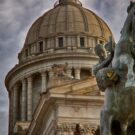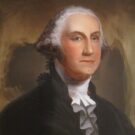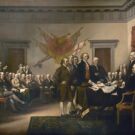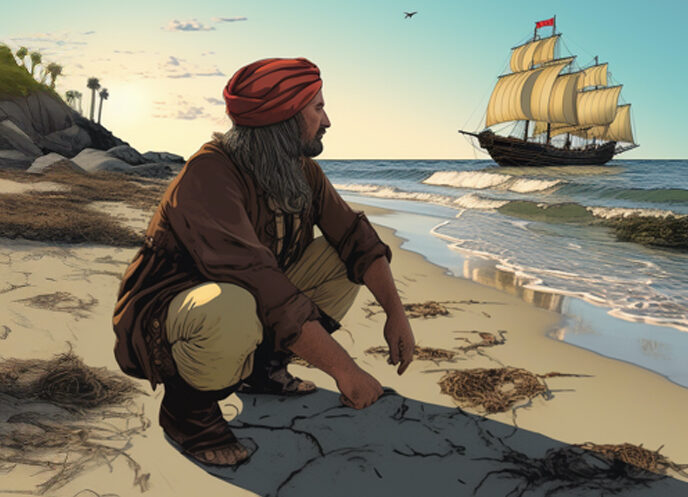Louisiana, The Pelican State
by Sandra Merville Hart Louisiana’s nickname is The Pelican State. Brown pelicans have been a symbol since early European settles noticed the bird’s nurturing way with their young. Brown pelicans live along the ocean and is the only type of pelican that dives into the water from the air to capture its food. The early history of Louisiana A French explorer, Rene-Robert Cavelier, sieur de La Salle, traveled on the Illinois and Mississippi rivers in 1682. He claimed the area for France and named it “Louisiana” after Louis XIV. One of the settlements built by the French was Nouvelle-Orleans to guard against Great Britain and Spain. France transferred the area of modern-day Louisiana to Spain during the French and Indian War. Spain ruled the area for 34...
Read MoreOklahoma, The Sooner State
By Sandra Merville Hart Oklahoma’s nickname is the Sooner State. Wagons, buggies, and horseback riders waited tensely to stake there claim in the Oklahoma Territory on April 22, 1889. A shot fired at noon signaling the start of the first “land rush.” Farmers, cowboys, and other settlers tore off to claim the best land available. Yet some folks didn’t wait for the signal shot—they set off earlier, giving Oklahoma its “Sooner State” nickname. The state’s name comes from two Choctaw words: okla means “people” and humma means “red.” The early history of Oklahoma Native Americans who built mounds lived in the Oklahoma area until about 1300 A.D. Looking for the “Lost City of Gold,” Spanish explorer Francisco Vasquez de Coronado arrived in...
Read MoreMaine, The Pine Tree State
by Sandra Merville Hart Maine is known as The Pine Tree State for the white pine forests that used to cover a large portion of the northeastern United States. Logging in the 1700s and 1800s left only about one percent of the original trees. Before colonial days, white pines grew as tall as 230 feet. Now they grow to 160 to 180 feet. The early history of Maine In 1607, George Popham led a group of English colonists to establish Maine’s first settlement, Fort St. George. Harsh climate conditions and Popham’s death prompted the colonists to return to England the following year. York, originally known as Agamenticus and then Gorgeana, became the United States first chartered city in 1641. Gorgeana was renamed York in 1652, the year southwestern Maine was annexed...
Read MoreNew Hampshire, The Granite State
by Sandra Merville Hart New Hampshire is known as The Granite State. The official state rock is also granite. New Hampshire’s early history In 1623, Captain John Mason sent David Thomson, who was a Scotsman, and Edward and Thomas Hilton of London along with others to begin a fishing colony in what is now known as New Hampshire. It became our third colony. First known as North Virginia The area was first named North Virginia. England’s King James changed the name to New England. At first, the area was controlled by the colony of Massachusetts, but later became a separate colony. Writer of Mary Had a Little Lamb Sarah Josepha Hale was a writer born in New Hampshire in 1788. In her late teens, she taught boys and girls at a private school. Mary, one of her...
Read MoreMaryland, the Old Line State
by Sandra Merville Hart Maryland’s nickname, “Old Line State,” was given by General George Washington. He referred to the Maryland Line, soldiers who bravely served in many Revolutionary War battles. Maryland’s early history King Charles I of England gave George Calvert the land north of the Potomac River in 1632. This land had originally been given to the Virginia colony. People of Catholic faith were mistreated in England. George wanted to begin a community where Catholics could worship freely. Named after a Queen King Charles I was married to Queen Henrietta Maria. Maryland was named after his wife. In 1634, it became our fourth colony. Francis Scott Key’s famous poem Francis Scott Key witnessed the British attack of Fort McHenry in 1814. This...
Read MorePennsylvania, The Keystone State
by Sandra Merville Hart Pennsylvania is known as the Keystone State because it was key to important ways the United States developed economically, politically, and socially. It was also the middle colony in the thirteen original colonies. In architecture, keystone describes the stone in the center of an arch – important because it holds all the arch’s stones in place. Pennsylvania’s early years In 1681, England’s King Charles II gave the area we know as Pennsylvania to William Penn because of a debt owed to his father. William, a Quaker, had a good relationship with the Native Americans. Pennsylvania played an important part in Revolutionary War In 1774, Philadelphia hosted the First Continental Congress. The Second Continental Congress officially...
Read More









